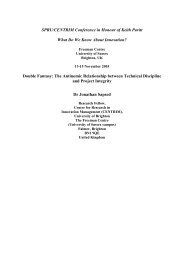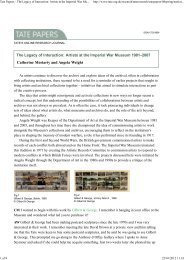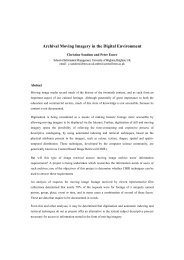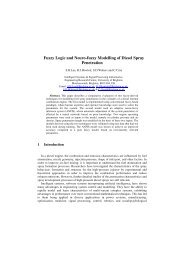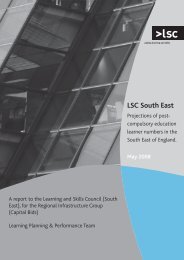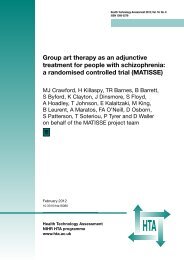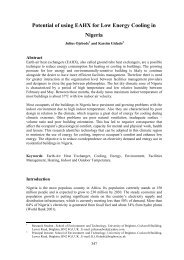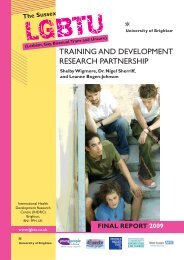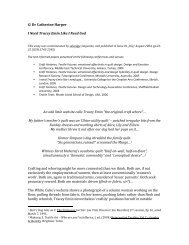TOP TIP - University of Brighton Repository
TOP TIP - University of Brighton Repository
TOP TIP - University of Brighton Repository
Create successful ePaper yourself
Turn your PDF publications into a flip-book with our unique Google optimized e-Paper software.
Reaching and Engaging Young Fathers<br />
✱ <strong>TOP</strong> <strong>TIP</strong>S<br />
• The lifestyles <strong>of</strong> some very<br />
young fathers and fathers-to-be<br />
<strong>of</strong> compulsory school-age,<br />
means having a dedicated<br />
worker with time to be flexible<br />
and re-schedule appointments<br />
can be helpful.<br />
• During initial contact, allow the<br />
young father to choose the<br />
venue to help them feel safe.<br />
Fathers First in the Isle <strong>of</strong> Wight<br />
tell us that this is a particularly<br />
effective way <strong>of</strong> re-engaging the<br />
young father on subsequent<br />
occasions.<br />
• Avoid going headfirst into<br />
parenting issues. For the<br />
youngest fathers, issues such as<br />
education, exclusion, housing,<br />
and money issues may well be<br />
more pressing. Fathers First and<br />
the TPSS in Hull say that nonparenting<br />
concerns (e.g.<br />
educational exclusion,<br />
relationship difficulties, and<br />
enquiries about employment and<br />
housing) are most <strong>of</strong>ten to the<br />
fore in their work with the<br />
youngest fathers.<br />
• Look at how you can develop<br />
positive working relationships<br />
with local schools and networks<br />
(e.g. designated mentors, school<br />
nurses, Connexions Personal<br />
Advisors etc.). Such contacts<br />
can be an effective route to<br />
promote the services available to<br />
school-age fathers and schoolage<br />
fathers-to-be. The Health<br />
Initiatives Team at Education<br />
Leeds receive nearly all their<br />
referrals <strong>of</strong> school-age fathers<br />
directly from contacts within the<br />
school system. However, other<br />
sources <strong>of</strong> referrals also include<br />
teenage pregnancy midwives<br />
and school-age mothers.<br />
22<br />
Supporting Young Fathers<br />
Learning Points<br />
‘School-age dads can be reached… it’s taken a lot <strong>of</strong> work to<br />
challenge and give other pr<strong>of</strong>essionals a helping hand up to<br />
understand that - we work hard to ensure health pr<strong>of</strong>essionals reach<br />
young dads as well as the mums. Every bit <strong>of</strong> information for young<br />
dads is there… and they’re really interested.’<br />
✱ Perhaps the largest barrier to engaging with school-age fathers is finding them in the first<br />
place. In school, acknowledging the young father <strong>of</strong>ten relies on him coming forward,<br />
whereas for the mother recognition and support are much more visible and explicit. It is<br />
important to explore how best the culture and ethos in schools can be influenced so that<br />
pupils who are parents-to-be (male or female) feel more able to come forward early to<br />
access the support that is available to them. In doing so, it is also important for such<br />
support (where available) to be rendered more ‘visible’ to both schools and pupils.<br />
✱ Evidence from work with school-age/teenage fathers shows the youngest fathers want to be<br />
involved in the care <strong>of</strong> their child, but their circumstances can conspire to exclude them:<br />
‘…<strong>of</strong>ten it’s a case <strong>of</strong> the status <strong>of</strong> their relationship - they may have<br />
only been together a matter <strong>of</strong> weeks and not <strong>of</strong>ficially in a<br />
relationship - and that relationship isn’t recognised by either family.<br />
So, very quickly the young man will be pushed out <strong>of</strong> the equation.’<br />
✱ It’s not just the attitudes <strong>of</strong> many pr<strong>of</strong>essionals that must be challenged about working with<br />
school-age and teenage fathers. The attitudes <strong>of</strong> young mothers and young fathers<br />
themselves also need to be challenged. Pilot research in Croydon and Lewisham (South<br />
London) by Working With Men (WWM) has revealed that many young fathers are much<br />
more involved with the young mother and their child than pr<strong>of</strong>essionals believe:<br />
‘It’s not only pr<strong>of</strong>essionals’ attitudes that are problematic here - we’re<br />
talking about something much more complicated. We’ve got to point<br />
a finger at those young mothers and young fathers… as there are<br />
some attitudes here that need to be challenged in their perception <strong>of</strong><br />
the housing and benefits system. They think that to present as a<br />
couple is problematic – so young mothers are saying very little about<br />
the young dads - they want them involved, the young father wants to<br />
be involved - but neither are telling anyone that they are involved.’



